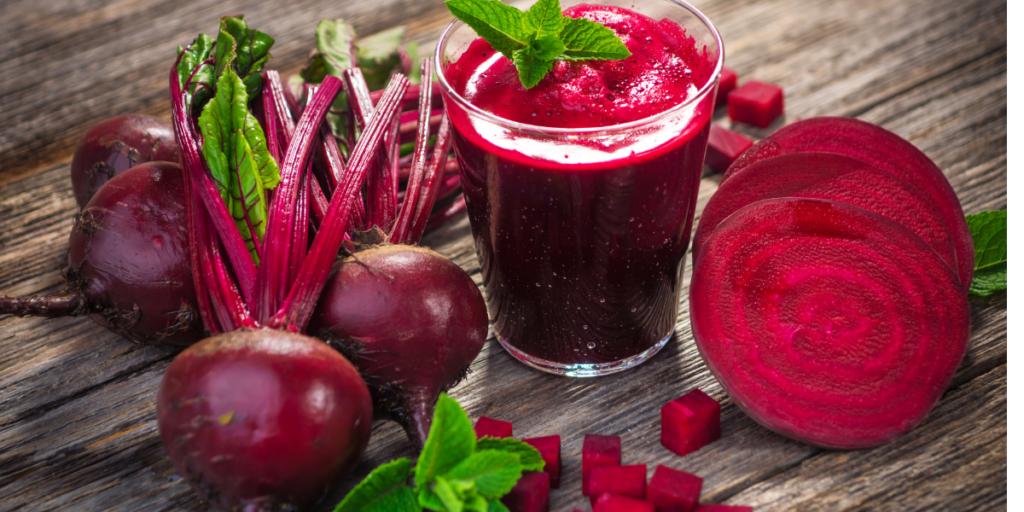No products in the cart.
Can Beets Improve Your Athletic Performance?

Are you looking to increase your endurance or improve your overall athletic performance? Are you trying to run, swim, or bike a little faster? Or maybe just workout for longer? Well, beets could be your safe and speedy answer to improving your athletic performance.
Can Beets Improve Your Athletic Performance?
Beets are considered an ergogenic aid, a performance enhancer or anything that provides a mental or physical edge during exercise4, due to their high amount of nitrates. Nitrates are converted to the active compound Nitric Oxide (NO), a vasodilator that facilitates cardiovascular function, blood flow, and oxygen availability to the muscles.3 Consequentially, NO increases both the power available to the muscles and length of time that muscles can exercise without tiring. This means beets have the ability to provide your body with more oxygen for a longer period of time during exercise leading to improved exercise tolerance and endurance.1
Beet juice as an ergogenic aid is still a fairy new area of research- it became mainstream after a 2009 study published in the Journal of Applied Physiology found the first direct association between beet juice consumption and improved exercise endurance. Thus, leading to the fad of beet juice as a “super food” and an influx of beet research in the following years. Research published in the Journal of the Academy of Nutrition and Dietetics showed eating cooked beets acutely improves running performance. In this study, after runners ate 200 grams (7 ounces) of cooked beets, they ran an average of 3% faster.3 In other studies, athletes supplementing with beet juice for 3-7 days experienced increased sprint test effort and improved response time5, completed 20% more repetitions before reaching exhaustion6, and showed a significant increase in power output during frequent, short-duration sprints.7 Beet juice also showed same-day benefits, where maximum power and optimal pedaling ratio increased with acute supplementation.8
Apart from exercise, beets have anti-inflammatory and detoxification properties. The betalain pigment that gives beets their vibrant color is the anti-inflammatory compound, which is being investigated for their role in heat disease and blood pressure management. One study found beet juice dropped blood pressure within a few hours of consumption by over 10 points.3 Furthermore, the nutrient called betaine found in beets may help liver cells eliminate toxins from our bodies.
To safely experience the benefits of beets, consume beet juice at a dose of 500mL (ie: 2 cups or 16 ounces) 3-4 hours before planned exercise. Incorporate beets into your diet with beet juice, beet smoothies, cooked beets, beet and goat cheese salad, beet cakes and more. However consuming more than recommended amounts or from concentrated sources, such as beetroot juice, may result in side effects. Side effects range from abdominal discomfort to discoloration of urine. Since beets are also high in oxalates excessive consumption may lead to the development of kidney stones and goat.3 In addition, the reddish-violet betalain pigment can temporarily discolor urine and bowel movement leading to a state of “beeturia.” This is harmless but causes alarm if mistaken for blood.
Bottom line, beet juice may enhance athletic performance by increasing oxygen consumption through providing the ability breathe in more air for a longer period of time. So, if you’re looking for ways to take your athletic performance to the next level, beets and beet juice may be your answer. However- don’t forget that there is no magic supplement or shortcut for hard work, time, and effort put into training to reach your goals. Incorporating beets in your diet provides a range of benefits from protecting against inflammation, ridding of toxins, to boosting athletic performance. So, next time you’re going for a long bike ride, doing sprints, or simply starting your day, try out the benefits of beets.
References
- Academy of Nutrition and Dietetics, et al. Position of the Academy of Nutrition and Dietetics, Dietitians of Canada, and the American College of Sports Medicine: Nutrition and Athletic Performance. Journal of the Academy of Nutrition and Dietetics. 2016.
- Unger, Kristin. Ergogenic Aid Handout. Just Beet It?: Evaluating the Ergogenic Effects of Beet Juice. University of Illinois at Chicago. 2016.
- Price, Kristin. Sansum Nutrition for Athletes: Benefits of Beets. Presidio Sports. Web Accessed 2 Mar 2017. < http://presidiosports.com/2014/08/sansum-nutrition-for-athletes-benefits-of-beets/>. 1 Aug 2014.
- Healthline
- Thompson C, et al. Dietary nitrate improves sprint performance and cognitive function during prolonged intermittent exercise. Eur J Applied Physiology. doi: 10.1007/s00421F015F3166F0. 2015.
- Aucouturier J, et al. Effect of dietary nitrate supplementation on tolerance to supramaximal intensity Intermittent exercise. Nitric Oxide. doi: 10.1016/j.niox.2015.05.004. 2015.
- Wylie, LJ, et al. Influence of beetroot juice supplementation on intermittent exercise performance. Eur J Applied Physiol. doi: 10.1007/s00421F015F3296F4. 2015.
- Rimer EG, et al. Acute Dietary Nitrate Supplementation Increases Maximal Cycling Power in Athletes. Int J Sports Physiology Performance. Dec 2015.
